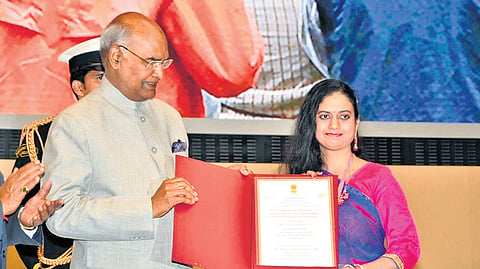

GUJARAT: In a world where birth of a boy is somehow more welcome than that of a girl, a differently-abled child is often cast aside. Yet, Rachna is scripting a story of her own.
Born in Ahmedabad in November 1992, she learned the hard way how deep such primitive notions run. Born to a family of decorated academics – mother, Dr Gyaneshwari Shah, PhD in Chemical Engineering and head of Plastic Engineering department at Government Polytechnic, Ahmedabad; and an electrical engineer father, The news of her birth was not celebrated. Rachna, 100% deaf from birth, was met with disappointment.
Her father and extended family held that a ‘disabled daughter’ had no place in their household. The solution? ‘Send her to an ashram.’ But a mother’s love intervened. Gyaneshwari refused to abandon her child. Unwavering, she chose to walk out of her marital home, embracing single motherhood after just a year and a half of marriage. She took Rachna with her, determined to shape a future where her daughter’s abilities would define her instead of her differences.
“No matter how uncertain the night, the morning comes with new light,” she repeated her motto. With nothing but faith in her daughter’s potential, Gyaneshwari worked tirelessly, ensuring that Rachna’s future would not be dictated by societal prejudices. And her constant support, her own mother – Rachna’s grandmother – who held her firmly amid all odds.
In 1995, Rachna was introduced to her first body-level hearing device. As technology advanced, so did her ability to hear. From basic devices to high-definition, multi-channel, digital hearing aids, she adapted to her abilities. Yet, her efforts were met with skeptical eyes. Those who had once abandoned her were blinded by the notion that the deaf and mute are forever bound by their disabilities, incapable – not just of hearing or speaking, but expressing and excelling.
Rachna refused. Determined, she shattered every misconception about hearing impairment. She not only learned to speak but mastered multiple languages besides her mother tongue. When the world said ‘people like her’ couldn’t study, sing, dance, or play instruments – she proved them all wrong.
Her journey was not just about survival; it was about triumph. Life tested Rachna, but it also blessed her with extraordinary talent in music and dance. Not just a performer, she became a symbol of perseverance, making the women (her mother and grandmother) who had rooted for her proud.
Bharatanatyam, a classical dance form that typically requires five years of training, became Rachna’s forte in just three. She performed the ‘Arangetram’ – a two-hour solo dance performance at Tagore Hall, a feat that astonished many. Besides, she mastered Indian classical music, played harmonium, and passed the preliminary examination in singing and instruments from Gandharva Mahavidyalaya with first-class honors.
However, her journey towards emancipation from the burden of tradition did not end with personal achievement. She was committed to share her gift with those subjected to a similar fate. Her prowess in folk dance and music came handy during stage and street performances aimed at public awareness against the misconceptions around deaf-mute.
She dedicates her time to serving others, teaching differently-abled children at Ankur School in Paldi, and providing training at Umang School for the Deaf. Her selfless commitment to education demonstrates that true success lies not just in achievements but in uplifting others.
Rachna never sought relaxation in her academic evaluation. She refused government aid, choosing to compete on equal footing.
Her determination gained international recognition – she featured as a role model for deaf-mute in Gujarat’s Sarva Shiksha Abhiyan campaign and included in a United Nations publication on inclusive education.
A world record
Rachna’s feats have earned her a place in Limca Book of Records, India Book of Records, and the Golden Book of World Records. She was honoured as the “Role Model Hearing Impaired Female” by the President of India. Further solidifying her legacy, Rachna’s systematic approach to learning has been recognized academically – she was awarded a PhD by the World Record University, UK.
Rachna has turned her limitations into stepping stones to success. Her skills extend beyond dance and music – she is proficient in embroidery, sewing, drawing, fabric painting and paper quilling. She is an inspiration for many, proving talent transcends limits.